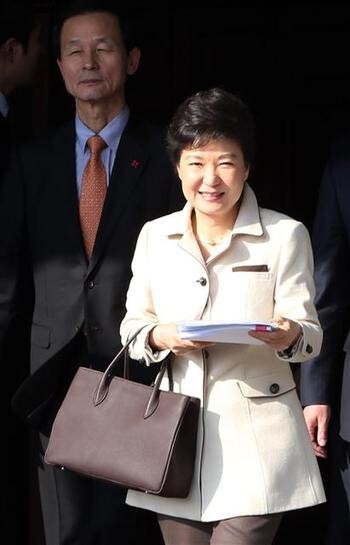hankyoreh
Links to other country sites 다른 나라 사이트 링크
President-elect Park puts inter-Korean ‘trust building’ plans on ice

By Seok Jin-hwan, staff reporter
On Feb. 13, Park Geun-hye continued her denunciations of North Korea’s nuclear test for the second consecutive day.
The President-elect said that even if North Korea does improve its nuclear capabilities, it would “bring on its own collapse” by becoming a “pariah” in the international community and leaving its own citizens destitute.
Speaking at a discussion on foreign affairs, national defense, and unification matters at the offices of her presidential transition committee in Seoul’s Samcheong neighborhood, Park went on to say that Pyongyang “needs to understand that the Soviet Union didn’t collapse because it didn’t have nuclear weapons.”
She also said that it would be a “miscalculation” for North Korea to use its nuclear capabilities as a pretext for demanding arms reduction talks rather than denuclearization talks.
“It won’t increase its bargaining strength any if it conducts a fourth or even fifth nuclear test,” she added. “That strength only increases when it has plans to give up its nukes.”
Park was hesitant about amending the “Korean Peninsula trust-building process” that served as a key plank in her election platform, calling instead for “changes from North Korea.”
“In the broader scheme of things, nothing is changing in the idea of a Korean Peninsula trust-building process, but it is obviously going to be affected when Pyongyang throws cold water on things and breaks the rules,” she said.
“North Korea needs to understand that we couldn’t implement it even if we wanted to.”
The President-elect reiterated that the process was not an appeasement approach, but one rooted in a strong deterrent. In particular, she instructed the committee members to “respond sternly to any provocations from North Korea, but keep an eye on the mid- to long-term strategy for peace on the peninsula.”
She also asked them to develop plans for combining the trust-building process with economic cooperation by linking bilateral relations with major countries in Northeast Asia to projects of “trilateral, multilateral, and Eurasian cooperation” to reflect the growing importance of trust with those countries.
Meanwhile, Park continued work on beefing up national security for a second day by setting up a North Korean nuclear program task force in the transitional committee.
Speaking at a morning briefing, spokesman Yoon Chang-jung explained that the task force, put together by Blue House national security office nominee chief Kim Jang-soo, would be examining appropriate measures on a case-by-case basis.
Officials with the committee’s different subcommittees also received a briefing from Kim at Wednesday morning’s meeting on the procedure after North Korea’s nuclear test, the reaction from the United Nations and international community, and cooperative efforts with the current administration.
Ryu Seong-geol, the secretary for the first economic subcommittee, reported that the financial sector and the real economy were “both stable, without any peculiar activities” following the test.
Please direct questions or comments to [english@hani.co.kr]

Editorial・opinion
![[Column] Park Geun-hye déjà vu in Yoon Suk-yeol [Column] Park Geun-hye déjà vu in Yoon Suk-yeol](https://flexible.img.hani.co.kr/flexible/normal/500/300/imgdb/original/2024/0424/651713945113788.jpg) [Column] Park Geun-hye déjà vu in Yoon Suk-yeol
[Column] Park Geun-hye déjà vu in Yoon Suk-yeol![[Editorial] New weight of N. Korea’s nuclear threats makes dialogue all the more urgent [Editorial] New weight of N. Korea’s nuclear threats makes dialogue all the more urgent](https://flexible.img.hani.co.kr/flexible/normal/500/300/imgdb/original/2024/0424/7317139454662664.jpg) [Editorial] New weight of N. Korea’s nuclear threats makes dialogue all the more urgent
[Editorial] New weight of N. Korea’s nuclear threats makes dialogue all the more urgent- [Guest essay] The real reason Korea’s new right wants to dub Rhee a founding father
- [Column] ‘Choson’: Is it time we start referring to N. Korea in its own terms?
- [Editorial] Japan’s rewriting of history with Korea has gone too far
- [Column] The president’s questionable capacity for dialogue
- [Column] Are chaebol firms just pizza pies for families to divvy up as they please?
- [Column] Has Korea, too, crossed the Rubicon on China?
- [Correspondent’s column] In Japan’s alliance with US, echoes of its past alliances with UK
- [Editorial] Does Yoon think the Korean public is wrong?
Most viewed articles
- 1‘We must say no’: Seoul defense chief on Korean, USFK involvement in hypothetical Taiwan crisis
- 2N. Korean delegation’s trip to Iran shows how Pyongyang is leveraging ties with Moscow
- 3‘Weddingflation’ breaks the bank for Korean couples-to-be
- 4Korea sees more deaths than births for 52nd consecutive month in February
- 5[Column] Park Geun-hye déjà vu in Yoon Suk-yeol
- 6Will NewJeans end up collateral damage in internal feud at K-pop juggernaut Hybe?
- 7[Column] Has Korea, too, crossed the Rubicon on China?
- 8Amnesty notes ‘erosion’ of freedom of expression in Korea in annual human rights report
- 9Samsung barricades office as unionized workers strike for better conditions
- 10[Column] The clock is ticking for Korea’s first lady